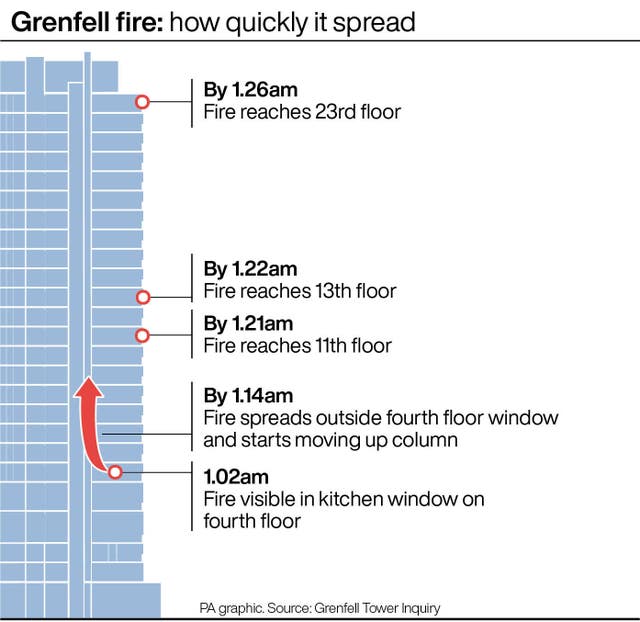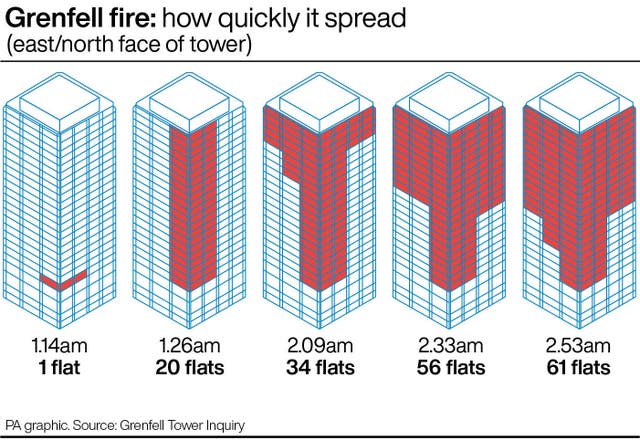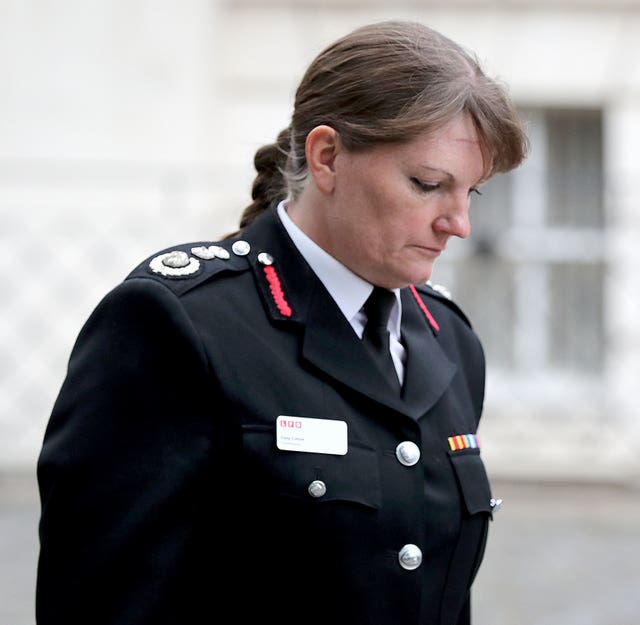Grenfell death toll could have been lower, report says
The first report into the 2017 apartment block fire has highlighted systemic failures by the London Fire Brigade.

Fewer people might have died in the Grenfell Tower fire had residents been evacuated while it was still possible and “serious shortcomings” not plagued the fire service’s response, an official report into the tragedy said.
The public inquiry’s first report into the blaze, due to be published on Wednesday but seen by the PA news agency, identified “systemic” failures by the London Fire Brigade (LFB).
It also accused the brigade’s commissioner Dany Cotton of “remarkable insensitivity” after she said she would not have done anything differently on the night.
Inquiry chairman Sir Martin Moore-Bick said prompt evacuation could have resulted in the saving of many more lives, and made a number of recommendations following the two-year investigation into how the disaster at the west London tower block unfolded.
But General Secretary of the Fire Brigades Union, Matt Wrack, told the BBC the ordering of the inquiry was “completely back-to-front” – a concern which has previously been voiced by the local community.
He said: “Firefighters’ actions on the night, which were remarkable in the circumstances, are now being scrutinised.
“Nobody is trying to avoid scrutiny, but we think that the ordering of the inquiry is completely back-to-front.”
The report was leaked on Monday ahead of publication, and campaigners said it was “unacceptable” that the bereaved and survivors who had not yet read the report were being “drip fed” the inquiry’s findings by the media.
Those given early sight of the report were forced to sign non-disclosure agreements, which remain in place despite the leak, preventing those directly affected by the fire from being able to react.
In his report, Sir Martin said the “principal reason” the flames shot up the building at such speed was the combustible aluminium composite material (ACM) cladding with polyethylene cores which acted as a “source of fuel”.
The panels were added in the refurbishment of the tower before the June 2017 fire.
The report also concluded the fire, in which 72 people died, started as the result of an “electrical fault in a large fridge-freezer” in a fourth floor flat.
Sir Martin said Behailu Kebede, who had lived in the flat, bore no blame for the fire.

Survivors had previously urged the judge to make a point of formally exonerating the resident, who was offered police protection after false reports of his culpability circulated online.
The judge said he had not intended to investigate whether the building complied with regulations at this stage, but there was already “compelling evidence” the external walls did not.
Instead of adequately resisting the spread of fire, they “actively promoted it”, he said.
Sir Martin also criticised the London Fire Brigade for its “stay-put” strategy when residents were told to remain in their flats by firefighters and 999 operators for nearly two hours after the blaze broke out just before 1am.
The strategy was rescinded at 2.47am.
Sir Martin said: “That decision could and should have been made between 1.30am and 1.50am and would be likely to have resulted in fewer fatalities.
“The best part of an hour was lost before Assistant Commissioner Roe revoked the ‘stay put’ advice.”
He added: “I identify a number of serious shortcomings in the response of the LFB, both in the operation of the control room and on the incident ground.
“It is right to recognise that those shortcomings were for the most part systemic in nature.”
Sir Martin also said “the LFB’s preparation and planning for a fire such as that at Grenfell Tower was gravely inadequate.”
He praised the heroics and bravery of individual firefighters, but described the “stay put” strategy as an “article of faith within the LFB so powerful that to depart from it was to all intents and purposes unthinkable”.

And he said those giving advice to trapped residents during 999 calls were “not aware of the danger of assuming that crews would always reach callers” – a key lesson from the Lakanal House fire in 2009, when six people died.
Sir Martin also took exception to Ms Cotton’s evidence that she would not change anything about the response of the fire service on the night.
“Quite apart from its remarkable insensitivity to the families of the deceased and to those who escaped from their burning homes with their lives,” he said, “the Commissioner’s evidence that she would not change anything about the response of the LFB on the night, even with the benefit of hindsight, only serves to demonstrate that the LFB is an institution at risk of not learning the lessons of the Grenfell Tower fire.”

He also said Ms Cotton’s evidence “betrayed an unwillingness to confront the fact that by 2017 the LFB knew (even if she personally did not) that there was a more than negligible risk of a serious fire in a high rise building with a cladding system”.
Ms Cotton announced her retirement in June.
An LFB spokeswoman said: “The Inquiry’s findings are not being published until Wednesday morning and it would be inappropriate for us to comment on them until then.”





